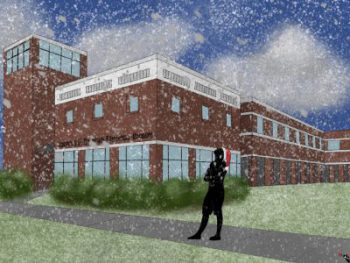Featured Image: Frances Perkins and Karen Bass arm in arm.
Mel Lhuillier | Marlin Chronicle
During the month of March, social workers get their chance to be appreciated.
A month of appreciation is more than many people get, but social workers deserve recognition for the amazing work they perform every day of the year. Arguably, in times like these, social work is an incredibly important and needed field.
Social workers are employed in many settings, such as hospitals, schools and in different levels of government. They work to improve the functioning of individual clients, our institutions and communities and ultimately, our society, advocating for anyone in need.
Social Work Month is celebrated every year by the National Association of Social Workers, a professional organization dedicated to guiding and promoting the field of practice. Each year during Social Work Month, a theme highlights the advancements and issues that social workers have faced. This year’s theme is “Breaking Barriers.”
Since its early years as a profession, social workers have had to break barriers to gain resources for their clients and to educate others about the profession. Many social workers are women, and many of those women are members racial minority groups who “break barriers” for themselves as well.
March is also Women’s History Month. This month of remembrance allows us to acknowledge the work done by women social workers. Several American women political leaders are, or were, social workers at one time. A few of these women include Frances Perkins, current Deputy Secretary of State Wendy Sherman and Karen Bass the mayor of Los Angeles. Let me put a spotlight on one of those women, Frances Perkins.
Frances Perkins (1880-1965), former U.S. Secretary of Labor, was the first woman to serve on a presidential cabinet. Not only did she author much of the New Deal federal programs (1933-1934) that revitalized our nation during a very difficult time, she worked tirelessly throughout her life to advance workers’ rights in America.
Another social worker who is “breaking a barrier” is Halaevalu Vakalahi. As the current President of the Council on Social Work Education she is the first Indigenous woman to hold that title.
We do not often learn about these women or their contributions, just as social workers often do a great deal of difficult work behind the scenes with clients and constituents often garnering very little attention.
Social workers are case managers, policy makers, therapists and change makers in various organizational settings. They’re educators and legislators. They pick us up when we’re down, dust us off and assist us in getting us back to where we want to be, no thanks asked for.
They’re not in it for the money, they’re in it to change their community, and the world, for the better.
We need social workers today and tomorrow. We need more people who are up to the task of improving our city.
For those who want a job that helps people from many different backgrounds and who want to spur change in their community, social work is the place to start.
The next time you learn about the New Deal, or how therapy can show someone how to improve their situation or about an older person being able to leave their job and retire, know that social workers are behind it. They are woven into the fabric of every area of progression in our country and our world.
Take this month to learn more about what social workers do for our communities and take some time to thank the social workers in your life.
Samantha Silvia ‘25 is a Social Work and Sociology double major. She is a writing consultant in the Writing Center and enjoys reading in her free time. Contact her at sgsilvia@vwu.edu.
By Samantha Silvia
sgsilvia@vwu.edu

